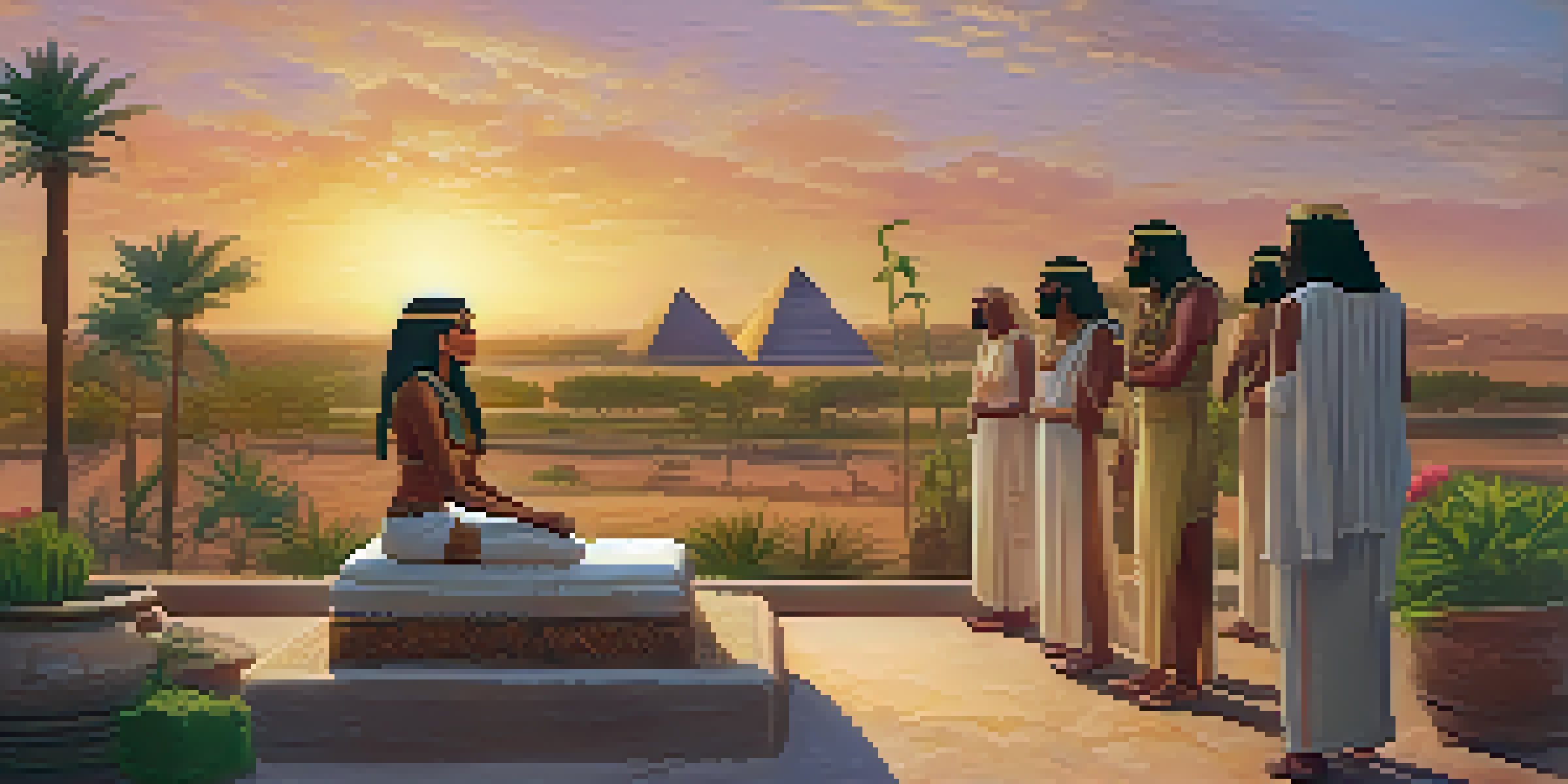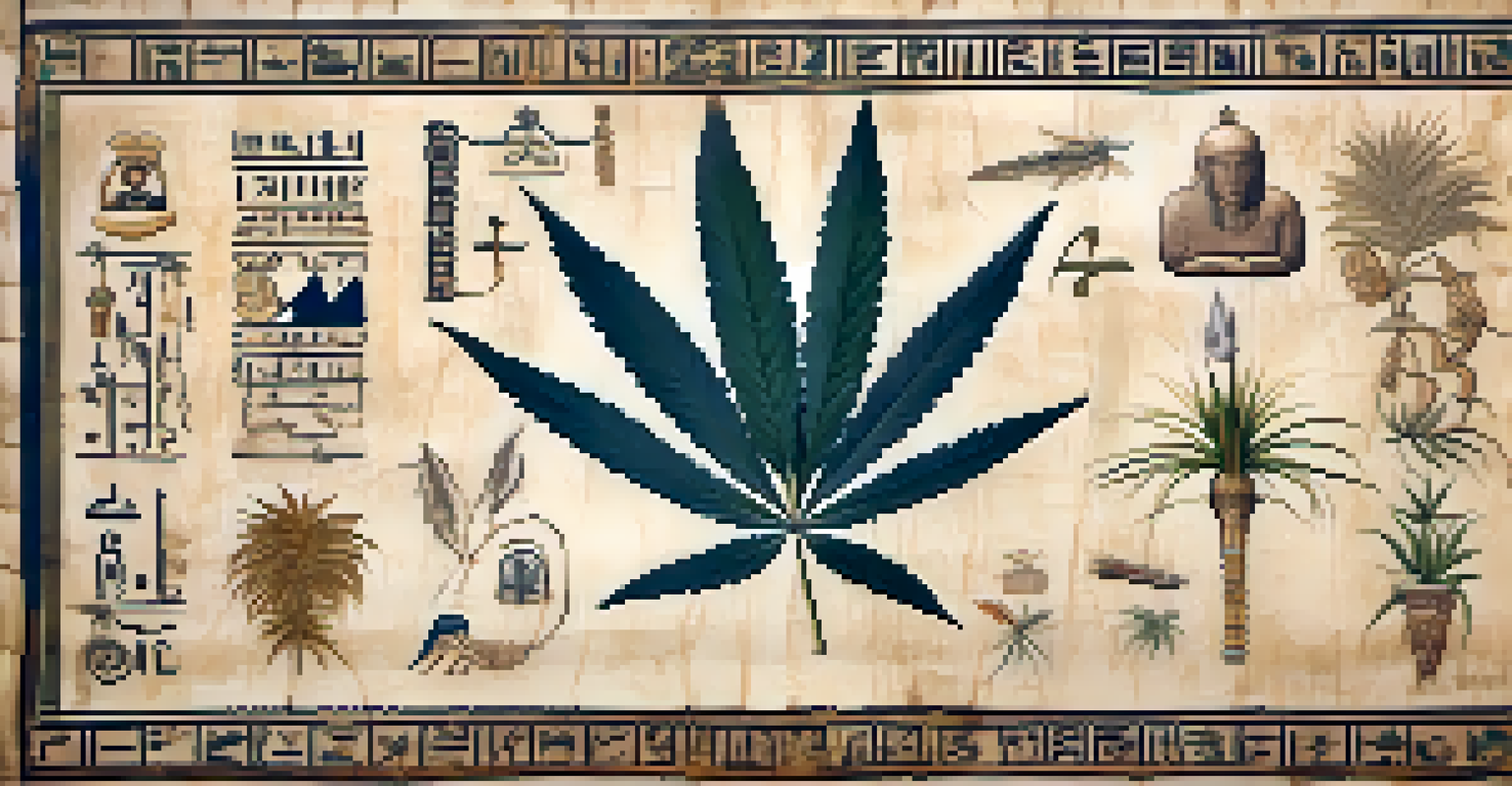The Role of Cannabis in Ancient Egyptian Religious Practices

Historical Context of Cannabis in Ancient Egypt
Cannabis, known for its psychoactive properties, has a rich history that intertwines with ancient Egyptian culture. Evidence suggests that the plant was used as far back as 3000 BCE, primarily for its medicinal and ritualistic purposes. The ancient Egyptians viewed plants as gifts from the gods, and cannabis was no exception, believed to have spiritual significance.
Cannabis is a symbol of life, fertility, and divine favor, suggesting that it was more than just a physical substance.
In the context of Egyptian society, cannabis was often associated with fertility and rebirth, aligning with the agricultural cycles that were central to their life. The plant was not only utilized in rituals but also had practical applications, including textiles and ropes. This versatility contributed to cannabis's revered status in the civilization.
Additionally, the ancient Egyptians documented their knowledge of cannabis in papyrus texts, showing that they understood its effects and potential benefits. These texts highlight the plant's importance, suggesting that it played a key role in both everyday life and spiritual practices.
Cannabis and Egyptian Deities
The relationship between cannabis and Egyptian deities is a fascinating aspect of their religious practices. For instance, the goddess Hathor, associated with fertility and motherhood, was often linked to the use of cannabis in rituals designed to invoke her blessings. Worshippers believed that cannabis could enhance spiritual experiences and deepen their connections with the divine.

Moreover, some scholars propose that cannabis was used in offerings to the gods, serving as a medium for communication between the earthly and the divine realms. This practice demonstrates the Egyptians' belief in the plant's sacredness, using it to invoke favor and protection from their deities. The intertwining of cannabis with worship practices illustrates its integral role in their spirituality.
Cannabis's Role in Spirituality
Ancient Egyptians integrated cannabis into rituals, believing it enhanced spiritual connections and invoked blessings from deities.
Additionally, the intoxicating effects of cannabis may have been seen as a means to transcend the ordinary, allowing practitioners to enter altered states of consciousness. This connection between the plant and spiritual experiences emphasizes its importance in their religious customs and beliefs.
Medicinal Uses of Cannabis in Ancient Egypt
Cannabis was not only a spiritual ally for the ancient Egyptians but also a valuable medicinal resource. They recognized its ability to alleviate ailments such as pain and inflammation, making it a common ingredient in various remedies. Ancient texts indicate that physicians utilized cannabis as an analgesic and anti-inflammatory agent, showcasing their innovative approach to medicine.
The reverence shown by ancient Egyptians for this plant serves as a reminder of the importance of understanding the cultural context of natural resources.
The plant's use extended beyond mere treatment; it was often integrated into rituals aimed at healing. Priests and healers would combine cannabis with other sacred herbs to create potent remedies, believing that the spiritual properties of cannabis could enhance the healing process. This synergy between medicine and spirituality highlights the holistic nature of their practices.
Additionally, the ancient Egyptians may have used cannabis in surgical procedures, as it was believed to ease pain during operations. This practical application underscores their advanced understanding of the plant's effects and their commitment to improving health and well-being within their society.
Ritual Practices Involving Cannabis
Rituals in ancient Egypt often incorporated cannabis, emphasizing its significance in spiritual and communal gatherings. For instance, it was common to use cannabis during festivals and ceremonies dedicated to various gods, enhancing the festive atmosphere while also promoting healing and unity among participants. The plant served as a bridge between the physical world and the spiritual realm.
Moreover, cannabis was likely used in rites of passage, such as births and marriages, where it was believed to bless individuals with fertility and prosperity. These rituals not only celebrated significant life events but also reinforced social bonds, highlighting the communal aspect of cannabis use in ancient Egyptian culture.
Medicinal Uses of Cannabis
Cannabis was recognized for its pain-relieving properties, used by ancient Egyptian physicians in various remedies and surgical procedures.
As part of these rituals, participants might have consumed cannabis in various forms, such as in oils or infused beverages. This practice not only elevated the spiritual experience but also fostered a sense of connection among the community, illustrating how cannabis played a vital role in the social fabric of ancient Egyptian life.
The Symbolism of Cannabis in Ancient Texts
Ancient Egyptian texts provide insight into the symbolic meanings attributed to cannabis. These writings often depict the plant as a symbol of life, fertility, and divine favor, suggesting that it was more than just a physical substance. The recurring imagery of cannabis in religious texts signifies its role in the broader narrative of existence and spiritual connection.
For example, the famous Ebers Papyrus, an ancient medical document, includes references to cannabis in the context of healing and protection. This illustrates how the Egyptians intertwined their medicinal practices with spiritual beliefs, viewing cannabis as a sacred tool for maintaining health and well-being. Such symbolism reinforces the idea that the plant was deeply woven into their cultural and religious identity.
In art and iconography, cannabis may have also appeared in depictions of deities and sacred rituals, further solidifying its status as a revered element in their spirituality. The symbolism of cannabis in these texts and images underscores its multifaceted role in ancient Egyptian life, serving as a reminder of the interconnectedness between nature, health, and divinity.
Modern Interpretations of Ancient Uses of Cannabis
Today, scholars and enthusiasts alike are re-evaluating the historical significance of cannabis in ancient cultures, including that of Egypt. Modern research has shed light on the plant's potential medicinal properties, prompting a renewed interest in its historical applications. This exploration not only honors ancient practices but also seeks to understand how they inform current medicinal uses.
Furthermore, the growing acceptance of cannabis in contemporary society parallels the ancient Egyptians' recognition of its value. As more people explore its benefits, there is a fascinating dialogue between ancient wisdom and modern science. This connection highlights how ancient practices can inform current understanding and potentially influence future applications.
Cultural Symbolism of Cannabis
Ancient texts and art depict cannabis as a symbol of life and fertility, reflecting its deep connection to health and spirituality in Egyptian culture.
This renaissance in cannabis research encourages a deeper appreciation for the plant's role in human history. By examining the ancient Egyptian perspective, we can gain insights into the cultural and spiritual dimensions of cannabis, allowing us to approach its modern use with respect and awareness of its rich heritage.
Conclusion: The Enduring Legacy of Cannabis
The role of cannabis in ancient Egyptian religious practices illustrates a profound connection between nature, spirituality, and health. From its use in rituals to its medicinal applications, cannabis was woven into the fabric of everyday life and belief systems. This enduring legacy invites us to reflect on the ways in which ancient cultures understood and utilized plants for their holistic benefits.
As we continue to explore the historical significance of cannabis, it becomes clear that its impact stretches far beyond its physical properties. The reverence shown by ancient Egyptians for this plant serves as a reminder of the importance of understanding the cultural context of natural resources. Recognizing this history can deepen our appreciation for cannabis in contemporary practices.

Ultimately, the story of cannabis in ancient Egypt is not just a tale of a plant; it is a narrative about humanity's relationship with nature and the spiritual dimensions of our existence. By honoring this legacy, we can foster a more respectful and informed approach to cannabis in our modern world.